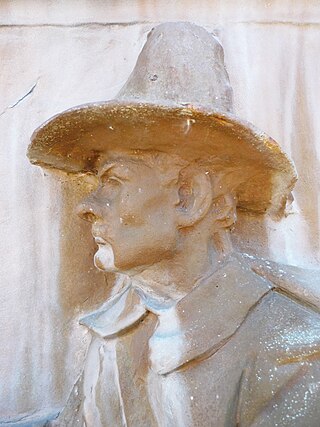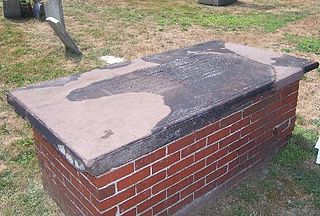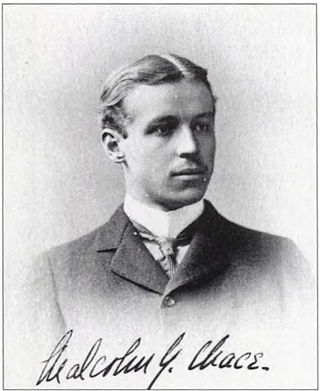
Stephen Hopkins was a Founding Father of the United States, a governor of the Colony of Rhode Island and Providence Plantations, a chief justice of the Rhode Island Supreme Court, and a signer of the Continental Association and Declaration of Independence. He was from a prominent Rhode Island family, the grandson of William Hopkins who was a prominent colonial politician. His great-grandfather Thomas Hopkins was an original settler of Providence Plantations, sailing from England in 1635 with his cousin Benedict Arnold who became the first governor of the Rhode Island colony under the Royal Charter of 1663.

John Underhill was an early English settler and soldier in the Massachusetts Bay Colony, the Province of New Hampshire, where he also served as governor; the New Haven Colony, New Netherland, and later the Province of New York, settling on Long Island. Hired to train militia in New England, he is most noted for leading colonial militia in the Pequot War (1636–1637) and Kieft's War which the colonists mounted against two different groups of Native Americans. He also published an account of the Pequot War.

Mary Dyer was an English and colonial American Puritan-turned-Quaker who was hanged in Boston, Massachusetts Bay Colony, for repeatedly defying a Puritan law banning Quakers from the colony. She is one of the four executed Quakers known as the Boston martyrs.

Samuel Ward was an American farmer, politician, Rhode Island Supreme Court justice, governor of the Colony of Rhode Island and Providence Plantations, and delegate to the Continental Congress where he signed the Continental Association. He was the son of Rhode Island Governor Richard Ward, was well-educated, and grew up in a large family in Newport, Rhode Island. He and his wife received property in Westerly, Rhode Island from his father-in-law, and the couple settled there and took up farming. He entered politics as a young man and soon took sides in the hard money vs. paper money controversy, favoring hard money or specie. His primary rival over the money issue was Providence politician Stephen Hopkins, and the two men became bitter rivals; the two also alternated as governors of the colony for several terms.
Philip Sherman (1611–1687) was a prominent leader and founding settler of Portsmouth in the Colony of Rhode Island and Providence Plantations. Coming from Dedham, Essex in southeastern England, he and several of his siblings and cousins settled in New England. His first residence was in Roxbury in the Massachusetts Bay Colony where he lived for a few years, but he became interested in the teachings of the dissident ministers John Wheelwright and Anne Hutchinson, and at the conclusion of the Antinomian Controversy he was disarmed and forced to leave the colony. He went with many followers of Hutchinson to establish the town of Portsmouth on Aquidneck Island, later called Rhode Island. He became the first secretary of the colony there, and served in many other roles in the town government. Sherman became a Quaker after settling in the Rhode Island colony, and died at an advanced age, leaving a large progeny.
Christopher Holder (1631–1688), was an early Quaker evangelist who was imprisoned and whipped, had an ear cut off, and was threatened with death for his religious activism in the Massachusetts Bay Colony and in England. A native of Gloucestershire, near Bristol in western England, Holder became an early convert to the Society of Friends, and in 1656, at the age of 25, made his first voyage to New England aboard the Speedwell to spread his Quaker message. All of the Quakers in his group were imprisoned, and then sent back to England on the same ship. Undeterred, Holder returned to New England aboard the small barque Woodhouse, landing in New Amsterdam in August 1657 despite few predictions of success. Though young, he was a leader among the eleven Quaker missionaries that fanned out among the American colonies. Holder, with his frequent companion John Copeland, went north to the Massachusetts Bay Colony to begin their evangelistic efforts in the face of increasingly threatening anti-Quaker laws. With little success on Martha's Vineyard, they moved to Cape Cod where they were warmly received in Sandwich, establishing the earliest Quaker meeting in America.

Benedict Arnold was president and then governor of the Colony of Rhode Island and Providence Plantations, serving for a total of 11 years in these roles. He was born and raised in the town of Ilchester, Somerset, England, likely attending school in Limington nearby. In 1635 at age 19, he accompanied his parents, siblings, and other family members on a voyage from England to New England where they first settled in Hingham in the Massachusetts Bay Colony. In less than a year, they moved to Providence Plantation at the head of the Narragansett Bay at the request of Roger Williams. In about 1638, they moved once again about five miles (8 km) south to the Pawtuxet River, settling on the north side at a place commonly called Pawtuxet. Here they had serious disputes with their neighbors, particularly Samuel Gorton, and they put themselves and their lands under the jurisdiction of Massachusetts, a situation which lasted for 16 years.
Barzillai Lew was an African-American soldier who served with distinction during the American Revolutionary War.

Joseph Wanton Sr. was a merchant and governor in the Colony of Rhode Island and Providence Plantations from 1769 to 1775. Not wanting to go to war with Britain, he has been branded as a Loyalist, but he remained neutral during the war, and he and his property were not disturbed.

William Brenton was a colonial President, Deputy Governor, and Governor of the Colony of Rhode Island and Providence Plantations, and an early settler of Portsmouth and Newport in the Rhode Island colony. Austin and other historians give his place of origin as Hammersmith in Middlesex, England, but in reviewing the evidence, Anderson concludes that his place of origin is unknown. Brenton named one of his Newport properties "Hammersmith," and this has led some writers to assume that the like-named town in London was his place of origin.

Major-General Humphrey Atherton, an early settler of Dorchester, Massachusetts, held the highest military rank in colonial New England. He first appeared in the records of Dorchester on March 18, 1637 and made freeman May 2, 1638. He became a representative in the General Court in 1638 and 1639–41. In 1653, he was Speaker of the House, representing Springfield, Massachusetts. He was chosen assistant governor, a member of the lower house of the General Court who also served as magistrate in the judiciary of colonial government, in 1654, and remained as such until his death." He was a member of the Ancient and Honorable Artillery Company of Massachusetts and held the ranks of lieutenant and captain for several years before rising to the rank of major-general. He also organized the first militia in Massachusetts.

Malcolm Greene Chace was an American financier and textile industrialist who was instrumental in bringing electric power to New England. He was a pioneer of the sport of ice hockey in the United States, and was Yale University's first hockey captain. He was also an amateur tennis player whose highest ranking was U.S. No. 3 in 1895.

William Greene Sr. was a governor of the Colony of Rhode Island and Providence Plantations. He was a clerk of the county court in Providence, deputy from Warwick, speaker of the Rhode Island Assembly, and then deputy governor from 1740 to 1743. He became governor for the first time in 1743 and served four separate terms for a total of 11 years, and died while in office during his final term.

Gideon Wanton was a governor of the Colony of Rhode Island and Providence Plantations who served for two separate one-year terms. His father was Joseph Wanton, a shipbuilder in Tiverton, and his mother was Sarah Freeborn, the daughter of Gideon and Sarah (Brownell) Freeborn. One of his great grandfathers was William Freeborn, who signed the Portsmouth Compact, becoming a founder of Portsmouth in the Rhode Island colony. Both of Wanton's parents were Quakers, and both were public speakers within the denomination.
William Robinson was a deputy governor of the Colony of Rhode Island and Providence Plantations.
Thomas Hazard was one of the nine founding settlers of Newport on Aquidneck Island in the Colony of Rhode Island and Providence Plantations. He settled in Boston and Portsmouth before settling Newport, but later returned to Portsmouth. His descendants include Commodores Oliver Hazard Perry and Matthew C. Perry and three colonial Rhode Island deputy governors.
Thomas Hopkins (1616–1684) was an early settler of Providence Plantations and the great grandfather of brothers Esek Hopkins, the only Commander in Chief of the Continental Navy during the American Revolutionary War, and Stephen Hopkins who was many times colonial governor of Rhode Island and a signer of the Declaration of Independence.

William Greene Jr. was the second governor of the state of Rhode Island, serving in this capacity for eight years, five of which were during the American Revolutionary War. From a prominent Rhode Island family, his father, William Greene Sr., had served 11 terms as a colonial governor of Rhode Island. His great-grandfather, John Greene Jr. served for ten years as deputy governor of the colony, and his great-great-grandfather, John Greene Sr. was a founding settler of both Providence and Warwick.

Armenia S. White was an American suffragist, philanthropist, and social reformer. She was the first president of the New Hampshire Woman's Suffrage Association, and was well known for her many years, along with her husband, Nathaniel White, of Concord, New Hampshire, in works of philanthropy and reform.













